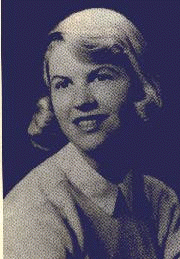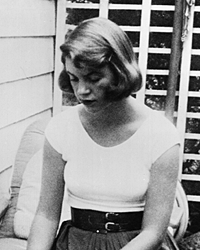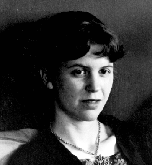Sylvia Plath (1932-1963)
 Sylvia
Plath is one of the most well known of modern American poets, though dead
now for over 30 years her reputation and following steadily continues to
grow. Her life (and death) have been taken up almost a sacred chalice.
By some she is seen as a martyr to her art, others a tragic character
who was ultimately a victim.
Sylvia
Plath is one of the most well known of modern American poets, though dead
now for over 30 years her reputation and following steadily continues to
grow. Her life (and death) have been taken up almost a sacred chalice.
By some she is seen as a martyr to her art, others a tragic character
who was ultimately a victim.
Sylvia Plath was born October 27th 1932 in Jamaica Plain, Massachusett, to
Dr. Otto Emile Plath (an expert in bees) and his wife Aurelia Schober Plath.
Otto Plath was a diabetic, yet he ignored medical advice about eating certain
foods. In 1940, he developed a sore on his toe and ignored the condition
until gangrene overtook the toe and he was hospitalized. Doctors performed
surgery, but it was too late, Otto's toe was amputated, later they amputated
his left foot and then the entire leg in hopes of saving him. November
5th 1940, Otto Plath died. His death had the most profound affect on
the 8 year old Sylvia. She used the medium of writing and especially
poetry as a form of fantasy and escape, but also to express the deep sense
of loss and anger she felt which culminated in some of her most powerful
work including "Daddy".

Sylvia Plath published her first poem when she was eight. As a young
girl she was sensitive, intelligent, compelled toward perfection in everything
she attempted, she was, on the surface, a model daughter for her mother,
popular in school, earning straight A's, winning the best prizes. Yet
her life seems to have been dogged by insecurity.
In 1949 Sylvia was appointed the editor of The Bradford High School Newspaper
and a year later entered Smith College on a Scholarship and she already had
an impressive list of publications, and while at Smith College she wrote
over four hundred poems. In 1954, having returned from a stay in New
York City where she had been a ``guest editor'' at Mademoiselle Magazine
(which had previously published "Sunday at the Mintons") Sylvia nearly succeeded
in killing herself by swallowing sleeping pills, an account of which can
be found in the thinly disguised autobiographical novel "The Bell Jar".
In 1955 Sylvia graduated summa cum laude from Smith College and won a Fullbright
scholarship to Cambridge University in England. In the following year,
1956, whilst at Cambridge, Sylvia met and married Ted Hughes, a
young English poet whose reputation was steadily growing, they lived at this
time in Cambridge.
 In 1960 Sylvia gave birth to a daughter, Frieda
Rebecca and her first book "The Colossus" was published. In "The Colossus"
her style is immaculate, almost painstakingly accurate, but with little of
the power of her later poetry. Sylvia and Ted settled for a while in
an English country village in Devon, and their son, Nicholas Farrar
was born on 17th January 1962, but shortly afterwards their marriage fell
apart, and Sylvia with Frieda and Nicholas moved to a small flat in London.
In 1960 Sylvia gave birth to a daughter, Frieda
Rebecca and her first book "The Colossus" was published. In "The Colossus"
her style is immaculate, almost painstakingly accurate, but with little of
the power of her later poetry. Sylvia and Ted settled for a while in
an English country village in Devon, and their son, Nicholas Farrar
was born on 17th January 1962, but shortly afterwards their marriage fell
apart, and Sylvia with Frieda and Nicholas moved to a small flat in London.
The winter of 1962-63, was one of the most bitter and coldest in
living memory. Sylvia was now living alone with two small children,
ill with flu and with little money. She often worked in the early hours
of the morning, whilst the world was dark, dormant and sleeping, sometimes
finishing a poem a day, before the children awoke. The austerity of
her life seemed to increase her need to write, and provided the inspiration
for her to write.
In these the last poems, the sense of impending doom grows, as death takes
on a desirable form that ultimately becomes overriding in its appeal, and
the sense of real mental anguish is measurable. On February 11th 1963,
aged 30, whilst her two children were in the adjoining room, Sylvia Plath,
placed her head in the oven and gassed herself to death.
Her great skill as a poet is in the use of close attention to rhythm, rhyme
and form and also through the deliberate use of sound through use of
alliteration, repetition and pattern. Her imagery grew intensely grotesque
and stark with images carefully chosen to shock the reader into empathy with
the extreme depth of emotions.
In 1965, "Ariel", a collection of some of her last poems, was published by
Faber; this was followed subsequently by "Crossing the Water" and "Winter
Trees" in 1971, and in 1981, "The Collected Poems" appeared, edited by Ted
Hughes.
To read three of my personal favourites click
here.
If you want to e-mail about
Sylvia Plath or anything else, please feel
free.
Links to other sites about Sylvia Plath
and her poetry.
 Sylvia
Plath is one of the most well known of modern American poets, though dead
now for over 30 years her reputation and following steadily continues to
grow. Her life (and death) have been taken up almost a sacred chalice.
By some she is seen as a martyr to her art, others a tragic character
who was ultimately a victim.
Sylvia
Plath is one of the most well known of modern American poets, though dead
now for over 30 years her reputation and following steadily continues to
grow. Her life (and death) have been taken up almost a sacred chalice.
By some she is seen as a martyr to her art, others a tragic character
who was ultimately a victim.

 In 1960 Sylvia gave birth to a daughter, Frieda
Rebecca and her first book "The Colossus" was published. In "The Colossus"
her style is immaculate, almost painstakingly accurate, but with little of
the power of her later poetry. Sylvia and Ted settled for a while in
an English country village in Devon, and their son, Nicholas Farrar
was born on 17th January 1962, but shortly afterwards their marriage fell
apart, and Sylvia with Frieda and Nicholas moved to a small flat in London.
In 1960 Sylvia gave birth to a daughter, Frieda
Rebecca and her first book "The Colossus" was published. In "The Colossus"
her style is immaculate, almost painstakingly accurate, but with little of
the power of her later poetry. Sylvia and Ted settled for a while in
an English country village in Devon, and their son, Nicholas Farrar
was born on 17th January 1962, but shortly afterwards their marriage fell
apart, and Sylvia with Frieda and Nicholas moved to a small flat in London.